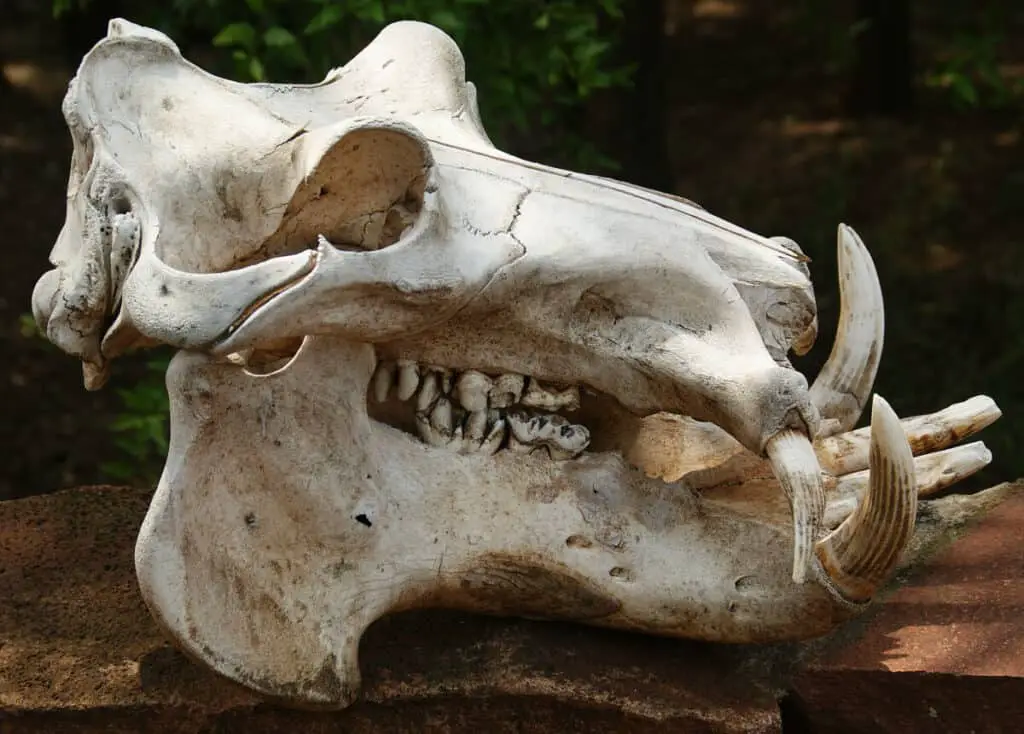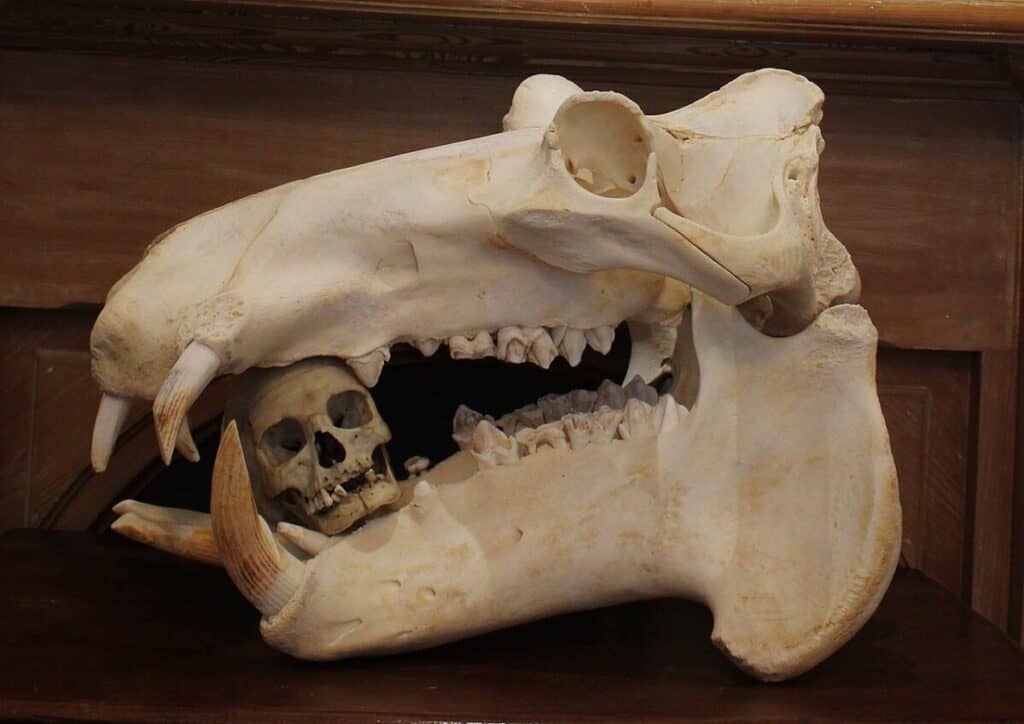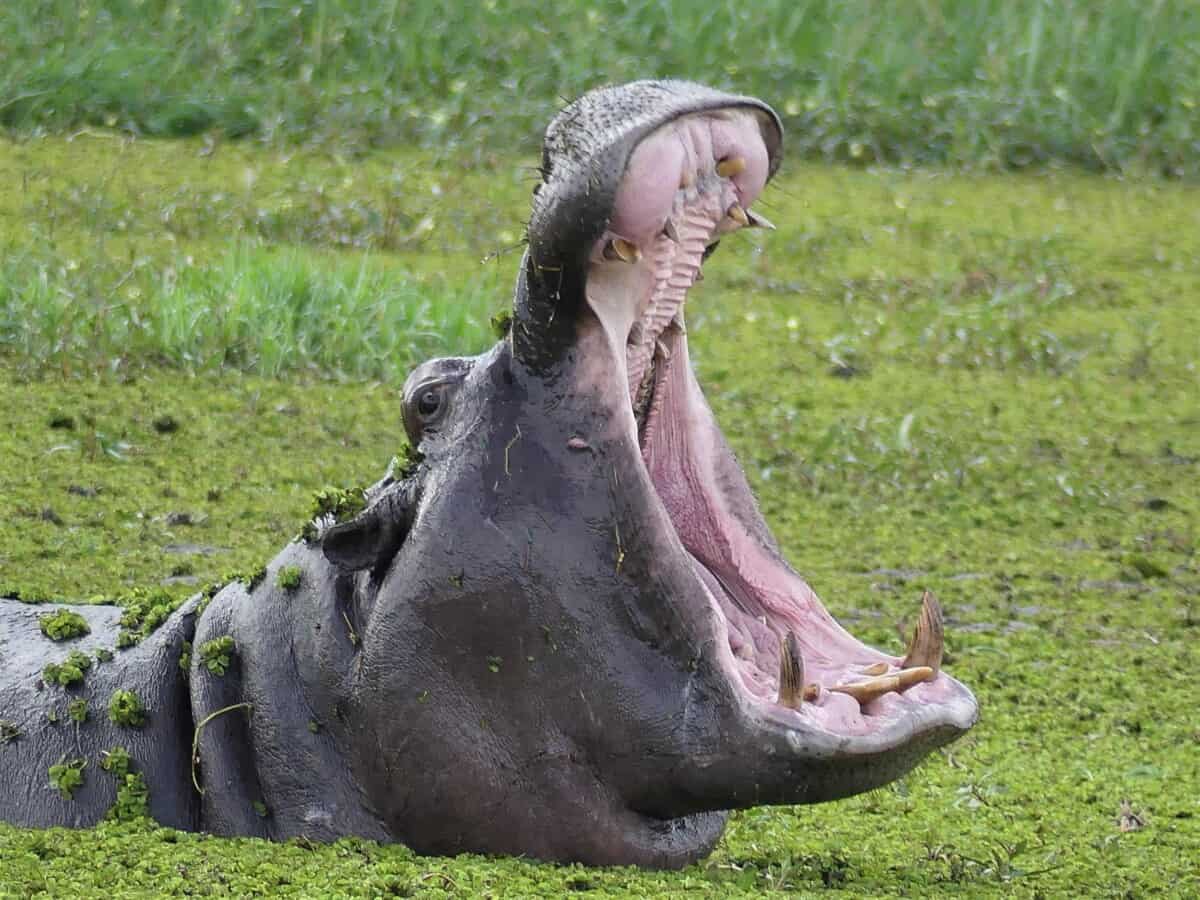We were on safari in a mokoro – a local canoe – in the Okavango delta, when our guide suddenly veered away from the main river channel and plunged into dense reeds. Why? He was trying to avoid a potentially deadly hippopotamus. I’ve done extensive research to learn why these animals are so aggressive.
Hippos are aggressive because they will readily defend their territory, both in and out of the water. They will attack and capsize boats and will not tolerate humans getting between them and the water. Females are particularly defensive and aggressive if anyone gets between them and their young. Hippos kill roughly 500 people every year with their giant 20-inch (50 cm) canine tusks.
“The majority of people from overseas are not aware of how dangerous these animals can be.”
Johan Eksteen, South African conservation ecologist
Why do Hippos Kill People?
The hippopotamus is one of the most feared and dangerous of all the animals in Africa.
People and hippos can easily encounter one another along the waterways of Africa. In the Okavango, for example, the villagers use mokoros for transportation, fishing and increasingly tourism. Every day, they pole their canoes along the river channels and lakes through prime hippo territory. Anyone living close to these animals acquires a healthy respect for hippos and will carefully keep track of sightings.
Many villagers have been killed or injured by hippos suddenly surfacing under their boat or charging from under water.
When we were in the Okavango, the polers were updating one another throughout the day. Hippos will spend many hours every day feeding on the vegetation at the bottom of a channel or lake. They can be entirely submerged and invisible when a boat appears, and if their territorial instincts are triggered, they may become aggressive and try to chase away the intruders.
Hippos are territorial and can attack anyone near the water
Male hippos will actively defend their territories from four-legged or two-legged intruders. Humans simply standing or sitting on a riverbank or lakeshore can unwittingly find themselves under attack by a male hippo who considers that spot to be part of his territory. Females tend to leave their young calves in the water while they feed on shore and can become aggressive if they sense anyone coming between them and their babies.
Hippos roam widely at night and can be far from water searching for food
During the night, hippos will often roam widely in search of food. While on night safari in South African National Parks we would often come across hippos over one mile from the pools where they spend their days. This can be a big problem for villagers walking in the dark. Anyone who gets inadvertently too close to a hippo, especially between the animal and the water, could easily trigger an attack.
Just to put this into perspective, it is estimated that mosquito borne disease kills about 1 million humans per year, snakes 50,000 and dogs 25,000. In comparison, hippos seem downright considerate, killing about 500 people every year. (Elephants and lions each kill about 100 humans per year, with wolves and sharks around 10 each.)
If a Hippo Capsizes Your Canoe Remember This
After passing close to a dangerous hippo our safari guide stopped our canoe to give us some pointers, “If a hippo comes up under our mokoro and tips us into the water, DO NOT SWIM! If you start splashing around at the surface, the hippo will easily find you and kill you! Stay under water and swim to the nearest bank and get out quickly.”
At first I thought he was kidding. But he was deadly serious and knew what he was talking about, having been born and raised in the nearby riverside village. “Yeah, right!,” I thought to myself, “Don’t worry, I’ll die of a heart attack and sink like a rock straight to the bottom. That’s where you’ll find ME!”
How Big are Hippo Teeth?
Hippo teeth are massive, especially in the males, and grow continuously!
The incisors can reach 40 cm (1 ft 4 in), while the canines reach up to 50 cm (1 ft 8 in). These giant canines and incisors are not used for feeding — the primary role is in combat and defense. They feed on coarse grasses and the teeth stay sharp as they grind together.
The giant tusks are like huge, sharp daggers! When you consider the immense force behind the jaws we can see that these are formidable weapons.

But of course that photo doesn’t really do the teeth justice without comparing them to the size of a human skull! Need I say more…?

Why do Hippos Yawn?
Repeated yawning is “a threat sign” or warning to keep your distance
Considering they are vegetarian, what are those impressive 20-inch canines used for? The tusks are used for defense and in combat between males competing for dominance and access to females.
Whenever I photograph hippos I try to get impressive shots showing that wide gaping maw with the giant tusks. It sets off the look of the beast and provides an epic image. It looks like the beast is repeatedly yawning and looking quite content. Wrong!
Johan Eksteen, a South African conservation ecologist, put it succinctly when he said: “The majority of people from overseas are not aware of how dangerous these animals can be.”
Eksteen has had extensive experience researching hippos for nearly three decades. He says the repeated yawning is “a threat sign.” These are called “dominance yawns” – your opportunity to get a good look at those impressive canines just in case you might be wondering who is boss. Works for me!
How Big are Hippos?
Hippos are massive: 9 to 14 ft (2.7 – 4.2 m) from nose to tail with an average weight of about 3-4,000 lbs (1,400-1,800 kg). A compact car, by comparison, typically weighs 2,800 to 3,000 lbs (about 1,300 kg). Big males can weigh more than double that – up to 4 tons (8,000 lbs or 3,600 kg).
Those numbers can be surprising if you’ve ever watched a hippo in the wild. During the day, they tend to stay in the water and are often submerged with only their nostrils and eyes breaking the surface. The bulk of their mass is hidden from view. This is one of the reasons they can be so dangerous.
This short video clip shows how silently and quickly hippos can move in a surprise attack that seemingly comes out of nowhere!
How Fast can Hippos Run?
Hippos might look ungainly, especially on land, but don’t be fooled. They can swim much faster than you or I and they can easily outrun a person at speeds of over 20 mph (32 kmh). Another reason to stay well clear!
This video of two males provides some idea of how quickly these huge animals can move on land.
Hippo Food and Feces – Fun Facts
Hippos are mainly vegetarian and can consume up to a hundred pounds (45 kg) of greens every day. They spend much of their time feeding on underwater plants or searching for tasty tidbits of greenery on land. Nearby villagers can have problems keeping hippos away from their crops even if they aren’t right beside a river. Surprisingly, they have also been known to kill or scavenge animals, including impala and kudu.
The amount of food consumed means that hippos produce plenty of poop, up to sixty pounds (27 kg) a day. Watching a hippo do its business can be one of the highlights of a trip to Africa (in my opinion, of course). The tail acts like a high-speed manure spreader, fanning back and forth so rapidly that it becomes a blur. The noxious spray can reach up to 30 feet (10 m) and everything – or anybody – in the vicinity gets a generous portion (something to remember on your next visit to the zoo!) But why? Male hippos use their distinctively pungent poop to mark their territory. Dogs pee, hippos poop, and lions roar.
Hippos can produce so much excrement, in fact, that it can become a big problem. It can accumulate at the bottom of the pools, especially during the dry season, and create anoxic pockets as bacteria use up all the oxygen. In cases where the anoxic water escaped into the main channels, large numbers of fish have been killed.
Hippos Like to Party Loud
My wife and I really enjoyed listening to hippos while on a five-day safari package in Naledi private game reserve, on the edge of Kruger NP. The beautiful Olifants river was right outside our cabin – full of crocodiles and all manner of creatures – and we were surrounded by the rich sounds of the African bush. But perhaps the most intriguing part was to hear the night sounds of rough-housing, fighting and mating coming from the hippo pool just downriver.
Hippos make lots of sounds and, if they are far enough away at night, they sound like they’re having a party. There are snorts, and whinnies… and mellifluous grunts. The various sounds always brought smiles to our faces, as long as the hippos didn’t get too boisterous during the wee hours of the night. The strict safari schedule had us up at 4:50 am every morning for early morning game drives, with the intention of arriving at watering holes to see the game before sunrise. We treasured every moment of deep sleep while the hippos partied!
Learn why Kruger National Park is one of the best choices in Africa for a budget self-drive safari.
Links
Witness an Impressive Duel Between Two Male Hippos
Finally, take a look at this impressive fight for dominance between two huge male hippos, complete with all the sounds, courtesy of BBC Earth.
Visit the Olifant River Live Online – Click Here
Thanks to the wonders of modern webcams, you can sit in the comfort of your own home or office and absorb the sights and sounds overlooking the Olifants river near Kruger National Park.
I love the sounds of the African bush, especially the abundant bird life, and you might be lucky enough to see a crocodile or game animal coming down to the water. Here’s a tip: you can scroll the recording back and forth to find dawn when the wildlife is most active.
My Presentation on Hippos
Check out this video of me giving a recent presentation about our experiences on a camping safari in the Okavango delta and Moremi Game Reserve. Includes some good shots of hippos!
Reference:
Dutton, C. L., et al. 2018. Organic matter loading by hippopotami causes subsidy overload resulting in downstream hypoxia and fish kills. https://www.nature.com/articles/s41467-018-04391-6
Check Out Our TOP Articles for Even More Fascinating Creatures
- Why do Lions Have Manes? (Do Dark Manes Mean More Sex?)
- How Do Lions Communicate? (Why Do Lions Roar?)
- How Do African Elephants Create Their Own Habitat?
- How do Electric Eels Shock Their Prey? Can an Electric Eel Kill You?
- How do Octopus Reproduce? (Cannibalistic Sex, Detachable Penis)
- Why do Male Octopuses Die after Mating? (How does Octopus Senescence work?)
- Do Jellyfish have Brains? How Can they Hunt without Brains?
- Why are Deep Sea Fish So Weird and Ugly? Warning: Scary Pictures!
- Are Komodo Dragons Dangerous? Where Can you See Them?
- How do Snakes Mate? (Snake Reproduction Videos and Diagrams) Warning – Graphic Images
- Koala Brains – Why Being Dumb Can Be Smart (Natural Selection)
- How Dangerous are Stonefish? Can You Die if You Step on One?
- What Do Animals Do When They Hibernate? How do they Survive?
- Leaf Cutter Ants – Surprising Facts and Adaptations; Pictures and Videos
- Irukandji Jellyfish Facts and Adaptations; Can They Kill You? Are they spreading?
- How to See MORE Wildlife in the Amazon: 10 Practical Tips
- Is it Safe to go on Safari with Africa’s Top Predators and Most Dangerous Animals?
- What to Do if You Encounter a Bullet Ant? World’s Most Painful Stinging Insect!
- How Do Anglerfish Mate? Endless Sex or Die Trying!
- How Smart are Crocodiles? Can They Cooperate, Communicate…Use Tools?
- How Can We Save Our Oceans? With Marine Sanctuaries!
- Why Are Male Birds More Colorful? Ins and Outs of Sexual Selection Made Easy!
- Why is the Cassowary the Most Dangerous Bird in the World? 10 Facts
- What is Killing Our Resident Orcas? Endangered Killer Whales
- Why are Animals of the Galapagos Islands Unique?
- Where Can You See Wild Lemurs in Madagascar? One of the Best Places
- Where Can You see Lyrebirds in the Wild? the Blue Mountains, Australia
- Keeping Mason Bees as Pets
- Why do Flamingos have Bent Beaks and Feed Upside Down?

